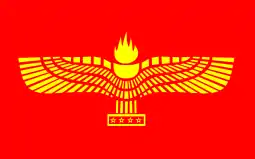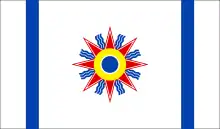Assyrians in Belgium
Assyrians in Belgium are Belgian citizens of Assyrian descent. They mainly live in Mechelen and Antwerp (cities in Flanders). Assyrians also live in Liège and Brussels. The majority of the Assyrian diaspora living in Belgium are of Turkish descent. They are from Bohtan (Beth-Qardu),[1] Tur-Abdin and Hakkâri.[2][3]
History
The first Assyrians came to Belgium around 1980; mostly from Tur Abdin in Turkey. They were political immigrants due to the Turkish-Kurdish conflicts in Southeast Turkey. They left their houses and moved to Europe for a brighter future.[3] The latest group of Assyrians immigrants come from Iraq and Syria. They began migrating after the first Gulf War. In the 1980s (as with other immigrants in Europe), nationalism started to develop among the Assyrians in Belgium. This was a huge step for oppressed Assyrians who had no hope or vision for the future. The Assyrian genocide played a major part to this negative mindset. The freedom that Assyrians received in the West triggered cultural, social, economic and linguistic projects.
Assyrians from Belgium demonstrated to raise awareness about the Assyrian genocide (just like other Assyrians).[2]
Current situation
Assyrians integrated into Belgian society while maintaining their cultural identity, supporting social events organized by Assyrian clubs. Assyrians in Belgium started projects to publish an Assyrian grammar book by Efrem Yildiz, organise trips with Association Assyro-Chaldeans Belgium, produce an Assyrian movie Akitu,[4] represent Assyrians in the Belgian government (such as Elisabeth Okmen), and founding the Assyrian Belgian Youth (AJB). Municipal councillors of Assyrian descent took office in Brussels, Etterbeek, Liège and Mechelen, including Ibrahim Erkan (Saint-Josse-ten-Noode, Christian Democrats), Sandrine Es (Etterbeek, Liberal Party) and Ibrahim Hanna (Etterbeek, Christian Democrats). New Flemish Alliance councilman Melikan Kucam is featured in Mechelen aan de Tigris (Mechelen on the Tigris), a book by Flemish author August Thiry about Assyrian refugees from Hassana in the southeastern Turkish district of Silopi.
Many Assyrians in Belgium belong to either the Chaldean Catholic Church or the Syriac Orthodox Church, with smaller numbers belonging to the Assyrian Church of the East.[5] The first Assyrians mainly worked in factories or opened restaurants, but today, most attend university and work in all economic sectors.[6]
References
- Bohtan Neo-Aramaic
- "Shlama Foundation". Shlama. Shlama.be.
- Thiry, August (June 2007). Mechelen aan de Tigris [Mechelen on the Tigris] (in Dutch). Mechelen: EPO. ISBN 9789064452246.
- Asmar, Riad. "Akitu the Movie". Akitu. Riad Asmar. Retrieved 23 September 2019.
- Nas, Kristof (2018-06-21). "Chaldeans in Belgium". Chaldeans in Belgium.
The people we know today as Assyrians are largely Chaldeans and Arameans / Syrian Orthodox. In Belgium there are hardly any Assyrians who belong to the Assyrian Church.
- "Diaspora en Assyrische Renaissance". the ARO. ARO.


